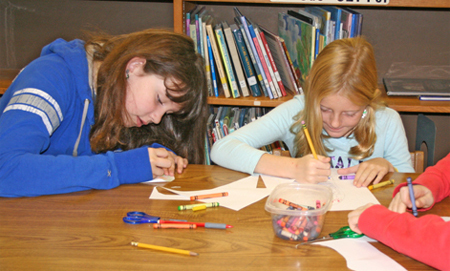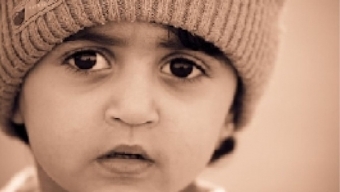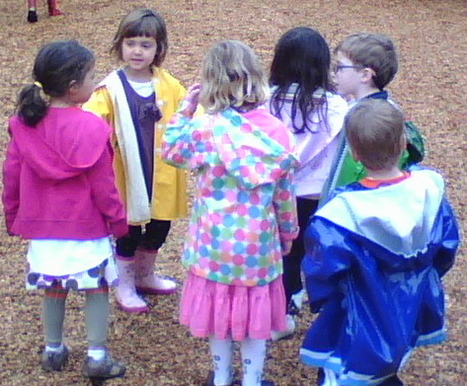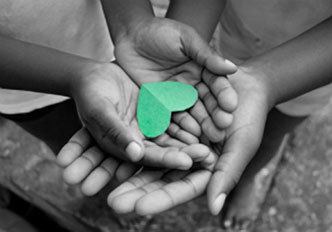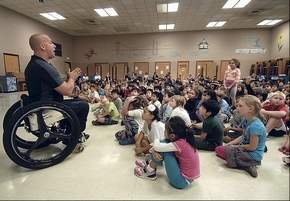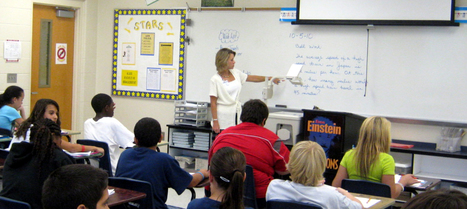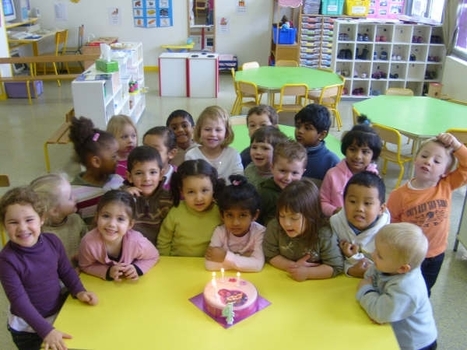 Your new post is loading...
 Your new post is loading...

|
Scooped by
Edwin Rutsch
November 3, 2011 10:33 PM
|
When you become more compassionate, who wins?
Your spouse, kids, coworkers? Yes, but science is showing that the biggest winner is you!
Compassion meditation is an ancient and powerful tool whose strength is being tested in many labs around the world. Richard Davidson of the University of Wisconsin recently demonstrated remarkable changes in the brains of people who had meditated on compassion for as little as two weeks. We have based this boot camp on his work. The bootcamp has now been completed. Check out the results here

|
Scooped by
Edwin Rutsch
October 26, 2011 1:55 PM
|
Students at Glendover Elementary are walking in someone else’s shoes during the school’s Special Needs Awareness Week. “Acceptance begins with knowledge and understanding,” said organizer Kim Grasso, who hopes it’s a starting point for greater acceptance and kindness toward all children. “We really want to hit home with children this age that you want to be empathetic to others and just because you have a disability doesn’t mean you’re disabled,” said Grasso, noting that hurdles sometimes can enhance a child’s other abilities and natural talents. “I think of my son as a little workhorse,” she added. “It’s amazing the obstacles he has to go through.”

|
Scooped by
Edwin Rutsch
October 25, 2011 11:53 AM
|
Over 14 million Americans are unemployed. Now imagine you’re one of them. Your savings are gone. You’ve lost your house. You’re a single parent. You’re down to your last $1,000. Can you make it through the month?' Spent is a simulation designed to introduce young people to what it means to truly be down on your luck.

|
Scooped by
Edwin Rutsch
October 14, 2011 4:22 PM
|
Regarded as one of the greatest human virtues by all major religious traditions, compassion is an emotional response and attitude toward others that is deeply empathetic. It enables us to connect to human suffering with care and understanding, acting in ways that brings comfort to those around us. Compassion causes us to remain charitable, even if others behave negatively. Research shows that compassion plays a key role in helping children develop into engaged, caring, and optimistic adults. 3 Ways Families Instill Compassion during Childhood Developing compassion in children involves all adults stepping up to do their parts – families, teachers, clergy, and community leaders. by MARILYN PRICE-MITCHELL PhD

|
Scooped by
Edwin Rutsch
October 3, 2011 12:48 PM
|
In the world of a toddler, the world revolves around him. Many toddlers end up throwing a temper tantrum because they don't understand that they can't always get what they want. Toddlers do not have a natural sense of empathy toward what others are feeling. However, you can lead your toddler through activities that can help him grasp the concept of empathy. Games Talking Reading Care Responsibility Play dates By Kimberly Turtenwald

|
Scooped by
Edwin Rutsch
October 2, 2011 6:22 PM
|
What is empathy? It is being able to put yourself in someone else's shoes, look at what is happening to them and try to understand how they might be feeling. Why is this important to teach children empathy? Well if your child is a more empathetic person they will most likely be less inclined to become a bully. So what can you do to teach them empathy? 1) One of the things that you can do as a parent right from the start is to... By AJ Mior

|
Scooped by
Edwin Rutsch
September 20, 2011 12:59 PM
|
Mind with Heart aims to create the conditions for young people to come to a firm commitment to empathy and compassion based on their own reasoning, experience and initiative. Mind with Heart is offering three-day breaks for teachers to explore the role of empathy and mindfulness in enhancing personal well-being, relationships with students and colleagues, and day-to-day motivation and efficacy. The full details will be available next week.

|
Scooped by
Edwin Rutsch
September 16, 2011 1:59 PM
|
Kohn artfully weaves together insights on topics ranging from the nature of empathy to the causes of war, from our tendency to blame our behavior on our genes to the importance of understanding evil from the inside. He explains why humans cannot be described as innately aggressive and suggests that our understanding of morality may be transformed by this new view of our species. Along the way, Kohn accounts for the curious attraction that a darker world view seems to hold for us. The Deadly Effects of "Tougher Standards" at the 2011 MAAP Conference http://www.youtube.com/watch?v=vmUMRX5yOt4

|
Scooped by
Edwin Rutsch
September 16, 2011 12:45 AM
|
How to train compassion? – was the title and the main question addressed in a recent workshop organized by the Department of Social Neuroscience at the Max Planck Institute in Leipzig, directed by Prof. Dr. Tania Singer, taking place in Berlin from the 21st to the 23rd of July 2011. Program of the Workshop
http://www.cbs.mpg.de/depts/singer/WoCo/Program

|
Scooped by
Edwin Rutsch
September 11, 2011 10:23 PM
|

|
Scooped by
Edwin Rutsch
September 4, 2011 10:45 PM
|
Most animals don't have the ability to talk, but that does not make them any less deserving of our respect and care. Some children see animals as smaller, weaker creatures, and these children may tease or take advantage of them. Children who have the ability to empathize with others, including animals, are more likely to develop into kind and thoughtful adults. Teachingyour children that animals have feelings, too, helps them to empathize with other creatures, no matter how big or small those creatures are.

|
Scooped by
Edwin Rutsch
August 25, 2011 11:29 AM
|
“If you want others to be happy, practice compassion. If you want to be happy, practice compassion.” - Dalai Lama I believe compassion to be one of the few things we can practice that will bring immediate and long-term happiness to our lives. I’m not talking about the short-term gratification of pleasures like sex, drugs or gambling (though I’m not knocking them), but something that will bring true and lasting happiness. The kind that sticks. The key to developing compassion in your life is to make it a daily practice. 7 Compassion Practices 1. Morning ritual... 2. Empathy Practice... 3. Commonalities practice... 4. Relief of suffering practice... 5. Act of kindness practice... 6. Those who mistreat us practice.... 7. Evening routine... by Leo Babauta

|
Scooped by
Edwin Rutsch
August 24, 2011 8:16 PM
|
Last week a parent asked, ”Can schools teach empathy?” Here’s my answer. Empathy isn’t taught. The human brain is wired for empathy (mirror neurons). Adults shape an environment; that environment shapes the child’s empathy. So schools can’t help educating a child’s empathy. If they don’t do it well, they do it poorly. Since we want young people to graduate from school with their social-emotional intelligence trained for success in their personal and professional lives, designing culture for the graceful expression of empathy is one of the chief responsibilities of all educators: school principals, teachers, and, yes, parents in their homes. by Rick Ackerly
|

|
Scooped by
Edwin Rutsch
October 29, 2011 5:15 PM
|
I want my daughter to be someone who shows compassion. I want her to someday be the 'big-girl' on the bus who reaches out to a child in need. But how do I instill that instinct in her? Our kindergarten daughter started riding the bus this year and it was not a smooth transition. Tears, pleas for mom or dad to drive her and sad glances out the bus window were a regular part of our morning routine for several weeks.While chatting about her bus trip the other night, we learned that an older girl on Erin’s bus has taken it upon herself to walk Erin to her classroom each morning after getting to school. We did not ask her to do this and didn’t even know it was happening. Erin took this as normal “big-kid” response, but I saw this as wonderful act of compassion.

|
Scooped by
Edwin Rutsch
October 25, 2011 2:35 PM
|
Researchers have developed a number of methods to try and increase empathy and understanding about schizophrenia in the wider population. One technique is to simulate the auditory and visual hallucinations sometimes experienced by people with schizophrenia, so that everyone can get an ‘insider’s perspective’ on the condition. A team of researchers have now conducted a systematic review of quantitative and qualitative studies that explore the impact that these simulated hallucinations have on people.

|
Scooped by
Edwin Rutsch
October 18, 2011 9:28 PM
|
Advanced Leadership Training for Professionals in
Education, Religion, Government and Nonprofits
November 14-17
Cascadia Center at Camp Brotherhood
Mount Vernon, WA The mission of the Compassionate Leader Intensive is to offer substantial training in leadership with the goal of encouraging effective action in the community.
The 5 day resident Intensive is a collaborative learning experience, with a high level of commitment needed to complete the course work successfully.
As a graduate of the Compassionate Leadership Intensive, you will have the opportunity to enroll in our online support community. This will include other graduates, instructors, and mentors who will be available to help address any concerns or questions you may have in further developing your compassion work – whatever that work is, and wherever it takes you. You will also be invited to engage in optional continued education through web blogs, compassion lab assignments and by supporting others in their efforts to gain experience.

|
Scooped by
Edwin Rutsch
October 7, 2011 11:53 AM
|
Each month the NVC Academy “THEME” gives you a fresh highlight of upcoming Live NVC Courses and new or featured NVC Multimedia Library Resources (available to subscribers) on popular NVC topics. This month’s theme is Empathy. In the coming weeks, learn to leverage the power of empathy to build meaningful empathic connections, even in trying circumstances, whether at home, at work or in the community.

|
Scooped by
Edwin Rutsch
October 2, 2011 11:07 PM
|
Can infants teach older children empathy? Canadian educator Mary Gordon is certain they can. In 1996 she founded a program called Roots of Empathy that brings an infant into an elementary classroom numerous times over the course of a year to help children identify and reflect on their own thoughts and feelings and those of others. Since then, Roots of Empathy has been featured in more 12,000 classrooms across Canada, is now catching on in the United States.. by Ethan Watters

|
Scooped by
Edwin Rutsch
September 24, 2011 12:55 PM
|
Students at Wayside Elementary School in Potomac learned a valuable life lesson this week: people are more alike than they are different. Wayside Elementary School hosted a week of empathy training:
Care to Connect - Wayside Celebrates PossABILITIES, a special needs awareness week. They started the week with a talk by athlete and motivational speaker Jeremy NC Newman, who spoke to the students from his wheelchair about overcoming difficulties. by Peggy McEwan

|
Scooped by
Edwin Rutsch
September 17, 2011 7:24 PM
|
Author Lisa Sellman provides several tips how to teach your child compassion. There is no virtue more needed in our world today than compassion. We need to nourish our children with compassion and you need to know how to teach your child compassion in a changing world. Compassion can help us and the generation of children we are here to teach how to find love for everyone including ourselves, community, and a meaningful life. As the Dalai Lama says, “If you want others to be happy, practice compassion. If you want to be happy, practice compassion.”This is why every parent needs to understand how to teach your child compassion.

|
Scooped by
Edwin Rutsch
September 16, 2011 12:40 PM
|
To create an environment that encourages compassion and empathy, students must do things together and then process their experiences in doing that activity. They must take the other's perspective and think about what others might be thinking and feeling. When students share their experiences which may be something like losing their favorite pet, others are then asked how they might feel so empathy is shared for the person who had the loss. In his book Punish by Rewards, Alfie Kohn rejects competition and illustrates how rewards and praising can interfere with internal motivation. Alfie encourages parents and teachers to notice and comment without judging or putting a value on a child's achievements.

|
Scooped by
Edwin Rutsch
September 14, 2011 1:15 PM
|
Empathetic, or active listening, enables the listener to not only understand what the speaker is saying, but it also allows her to identify with the speaker’s emotions. As a result, the empathetic listener becomes more compassionate, tolerant and accepting of differences. However, becoming an empathetic listener takes practice. A beginning empathetic listener should practice in low-stress situations until the process becomes automatic. Then she will be able to use her empathetic listener skills in difficult, highly emotional situations.

|
Scooped by
Edwin Rutsch
September 9, 2011 6:49 PM
|
Routines and preparedness are important for planning a child’s education, but, in reality, they do not always go according to plan. Children and parents must come together on core values in the between stages of life to prepare children for school. Compassion is one value that is the most valuable of all in 2011. To help a child experience and understand compassion is key. Children do not always show compassion on the playground when someone gets hurt, or in the classroom when a classmate has trouble answering questions. As parents and teachers, it is our job to model compassion and to teach children that every individual is unique. By Windy Evans

|
Scooped by
Edwin Rutsch
August 28, 2011 8:22 PM
|
Resources, research, and information for parents teachers and community members to build safe caring and inclusive schools and communities... Empathy/Affective Education Affective education helps students understand their own and others' feelings. Self-awareness and the identification and appropriate expression of feelings are emphasized. Students are encouraged to predict how others might feel and to respond to them by showing care or providing comfort. Empathy is a significant factor in the development of respect in relationships and in the control of aggressive behaviour. img http://bit.ly/k5w2Dp

|
Scooped by
Edwin Rutsch
August 25, 2011 12:45 AM
|
Listening is under – rated. We take it forgranted as something that we know how to do. Teaching deep compassionate listening is part of learning how to do restorative justice and certainly how to be in Circle. Listening without judgement is really hard. We make split second judgements about what we agree and disagree with about the person speaking. Our brains index information and to file it, it needs labeled. Judging is a natural and normal response so we can file away details, opionions and information for further use
|



 Your new post is loading...
Your new post is loading...



